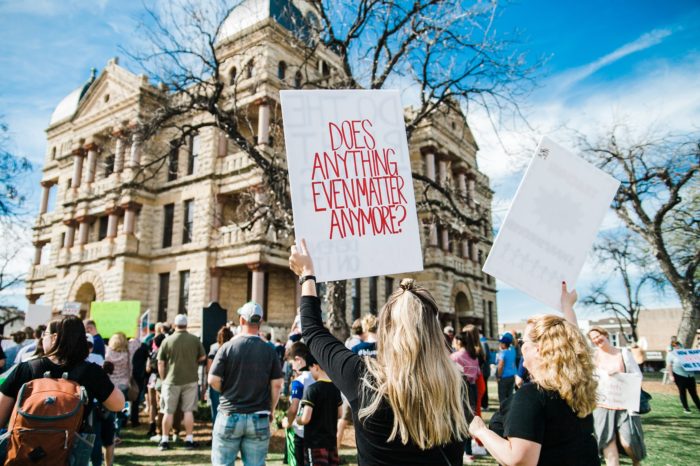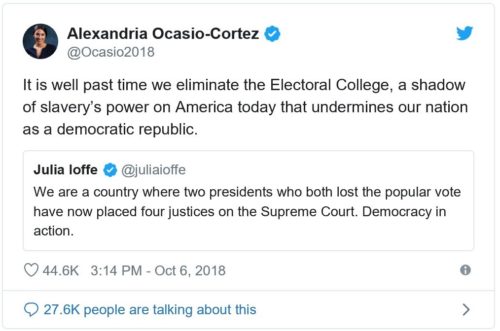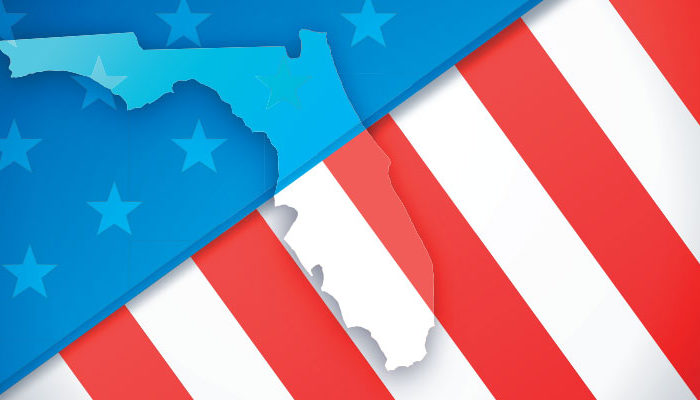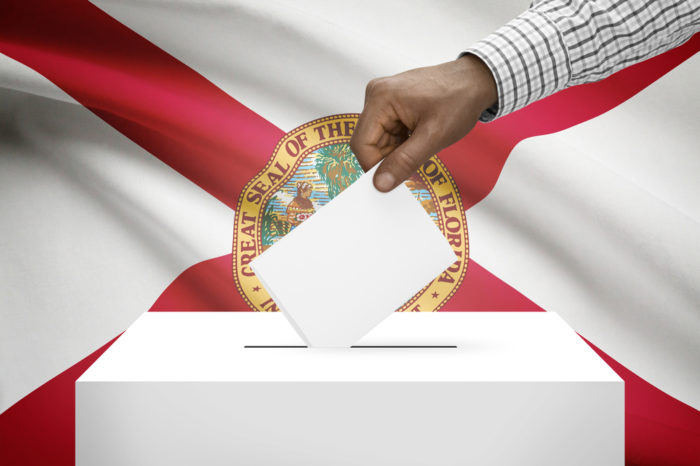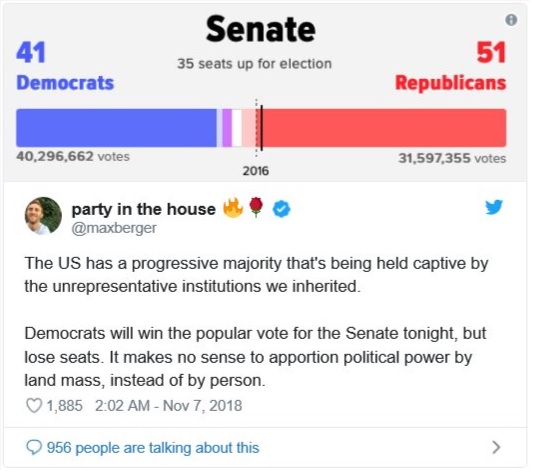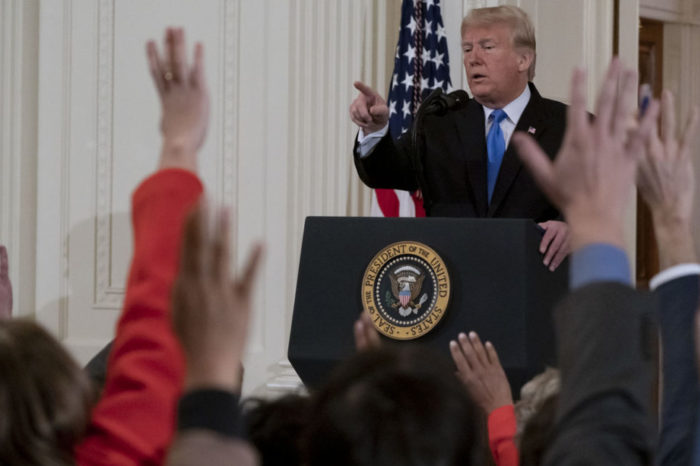On election day, Democrat Nikki Fried lost in a very close race to Republican Matt Caldwell for the Florida Cabinet office of agriculture commissioner. But after Broward’s rounds of late — illegally late — vote tallies, she is now ahead by 5,326 votes,
So in a display of dizzying chutzpah, she has claimed victory and started working on a transition team — before the recount…in a race where she is ahead by six-one-hundredths of one percent (0.06). That’s a problem for a few reasons. Of course the closeness, but also the reality that the most recent tallies do not include the overseas votes, which are primarily military and those tend to skew heavily Republican.
Now the mischief in Broward may still cancel those out, but it’s worth noting that all things being equal at this point, the likelihood of her not losing votes in the recount including military ballots is thin.
11/10/18 — 5:55 p.m.
The official recount is underway, and we’ll see if the re-writing of Florida’s election laws after the disastrous 2000 presidential election has created the smoother process that was promised.
Florida Secretary of State Ken Detzner called for automatic machine recounts in races for U.S. Senate, governor and agriculture commissioner this afternoon after receiving unofficial vote counts.
This was mandatory. Statewide contests decided by less than a half a percentage point must go through a machine recount — everything is fed back through the machines. This is the case for the races between Gov. Rick Scott and U.S. Sen. Bill Nelson; Congressman Ron DeSantis and Tallahassee Mayor Andrew Gillum; and Matt Caldwell and Nikki Fried.
If after this, the vote is less than one-quarter of one percentage point, then by law the vote must go to a manual recount, which opens the door for the incompetence and mischief of Broward and Pam Beach counties. It looks like the Scott-Nelson race will likely qualify for that.
EARLIER…
11/10/18 — 10:25 a.m.
The recount drama has now expanded to the the U.S. Postal Service.
The USPS is investigating its handling of absentee ballots mailed through a sorting facility in Opa-locka — which is located in Miami-Dade County, just south of Broward County — to “verify that all ballots have been handled in accordance to USPS service standards.”
A group of liberal activists protested outside the federal building, claiming possible voter suppression and sharing photographs they claimed showed scores of uncounted ballots sitting inside the facility’s mail room, according to the Miami Herald.
“At this time, we have no information to suggest any ballots were not properly handled and provided to local election officials, per our established process,” said Debra J. Fetterly, a USPS spokesperson with the South Florida District.
“What we are demanding is some transparency,” said Caroline Thompson of the Advancement Project, a civil rights organization. “Voters deserve to know if their ballots are sitting in a mailing facility.”
But apparently these were ballots that were postmarked after Election Day, and thus not legally eligible to be counted. Democratic Congresswoman Frederica Wilson, whose district includes Opa-locka facility, confirmed that postal officials told her the ballots left behind were postmarked after Nov. 6 — Election Day.
According to the Florida Division of Elections, absentee ballots must be received by the Supervisor of Elections office no later than 7 p.m. on Election Day. A 10-day extension is offered only for overseas voters, primarily members of the military.
11/09/18 — 8 p.m.
Gov. Rick Scott has won the first round in the process battle.
In Palm Beach County, a Circuit Court Judge granted the Scott team’s request for an injunction and ordered the Palm Beach County Supervisor of Elections to submit “overvoted” and “undervoted” absentee ballots to the Palm Beach County Canvassing Board for an open and public review of each vote before they are counted.
In Broward County, a judge ordered Broward County Supervisor of Elections Brenda Snipes to allow immediate inspection of voter records after an emergency hearing prompted by Scott’s legal team. The Judge said the Supervisor must allow inspections by 7 p.m. Friday evening.
And another lawsuit has been filed by Rep. Matt Caldwell, the Republican candidate for commissioner of agriculture and consumer services, who had apparently won on election night but now is behind.
Caldwell’s lawsuit asks the court to determine if Snipes, the Broward County supervisor of elections, “illegally included ballots after polls closed” Nov. 6. His campaign also filed a public records request for all vote count communications and emails between Snipes, her team and anyone else regarding ballot counting.
And hundreds of protesters gathered outside the Broward County elections headquarters, calling for Snipes to be locked up. Snipes office called Lauderhill police to provide protection, although it was not clear such a step was necessary.
11/09/18 — 12:30 p.m. Original Story
Well, Broward and Palm Beach counties have screwed up another national election. It cannot be emphasized enough that these are the two most heavily Democratic counties in Florida, and before this election, they were known for incompetence and, particularly in Broward, for corruption.
So those of us who have lived in Florida a long time recognize this pattern of recount corruption. Nonetheless, this time we have a Governor who will come out firing and already has filed a lawsuit against Broward and directed the Florida Department of Law Enforcement to investigate the county elections office. And it goes without saying, yet we will say, we have a President who is more than willing to enter the fray and fight back.
Neither of these leaders existed in the infamous 2000 Florida presidential recount, which absolutely would have eventually gone to Al Gore if the U.S. Supreme Court had not stepped in and said, “Enough!” Remember, Palm Beach was the “hanging chads” county and they would have continued to keep “finding” more Democrat votes.
With that context in mind, The Revolutionary Act will be keeping a running update of the recount shenanigans that will have national implications.
Current Tallies
Republican Gov. Rick Scott leads Democratic Sen. Bill Nelson in the U.S. Senate race by 0.18 percent, about 15,000 votes — down from the 70,000 on election night.
Republican Congressman Ron DeSantis leads Tallahassee Mayor Andrew Gillum by 0.44 percent, about 36,000 votes.
The Democratic voting “indiscretions” have already flipped one statewide Florida race to a Democrat. Nikki Fried now has a lead of 0.04 percent over Republican Matt Caldwell for the Cabinet post of agriculture commissioner. That’s 2,915 votes. But we all know it will only grow for the Democrat. Caldwell had won that race on election night.
Gov. Rick Scott
Scott has accused Broward Supervisor of Elections Brenda Snipes and Palm Beach Supervisor of Elections Susan Bucher of trying to steal the election — and not without merit.
Snipes has a long and well reported history of violating election laws, the last time being when she destroyed ballots too soon in the re-election of Debbie Wasserman-Schulze in 2016. Scott has ordered the Florida Department of Law Enforcement to investigate Snipes.
Scott has the authority to suspend Snipes and/or Bucher from office. To do so, he must cite evidence of malfeasance, misfeasance, neglect of duty or incompetence. It seems there is prima facia evidence for incompetence. If he does that, he can then appoint an interim elections supervisor.
Scott has filed suit against Snipes, alleging noncompliance with Florida’s Public Records Act by not allowing the inspection of the ballots as required under law. “The allegations are part of what appears to be a broader array of inconsistencies in vote counting,” writes Julio Gonzalez at the Federalist Pages.
“It has been over 48 hours since the polls closed” and ballots are still being “found” in Broward and Palm Beach, Scott said. “The people of Florida deserve fairness and transparency” and Floridians should be very worried about “rampant fraud” in Tuesday’s elections.
Later in the evening, Scott announced the lawsuit: “I will not sit idly by while unethical liberals try to steal this election.”
Sen. Marco Rubio
The Senator not known as a bomb-thrower has gone on a tear on the recount fiasco, and its refreshing. This is a little like when Sen. Lindsey Graham went off during the Judge Kavanaugh hearings. Even mild-mannered Republicans have really begun to have enough of what Democrats are doing and the anger and frustration is rising.
Rubio tweeted out a series of pieces of evidence that essentially makes the case that Snipes held back votes in some reserve method to pull out in case of a recount. It’s pretty incendiary, but also pretty compelling.
Here’s the full tweet storm:
“Long but IMPORTANT THREAT ON ELECTIONS IN #FLORIDA.
#BayCounty was hit by a Cat 4 Hurricane just 4 weeks ago,yet managed to count votes & submit timely results.
Yet over 41 hours after polls closed #Broward elections office is still counting votes?
#Broward supervisor:
- says she doesn’t know how many ballots are left to be counted; &
- Isn’t reporting hourly or regularly, but rather releasing thousands of additional votes, often in the overnight hours,that are chipping away at GOP leads
#Broward elections department has a history of violating the law:
A court found they improperly handled votes by mail:
https://www.politico.com/states/florida/story/2018/08/13/judge-sides-with-florida-gop-in-absentee-ballot-dispute-with-broward-county-555553 …
Court found they destroyed ballots in 2016 in violation of state & federal law:
https://www.politico.com/states/florida/story/2018/05/14/florida-to-monitor-broward-election-chief-after-judge-finds-unlawful-ballot-destruction-in-wasserman-schultz-race-415832 …
Now democrat lawyers are descending on #Florida. They have been very clear they aren’t here to make sure every vote is counted.
- They are here to change the results of election; &
- #Broward is where they plan to do it. A U.S. Senate seat & a statewide cabinet officer are now potentially in the hands of an elections supervisor with a history of incompetence & of blatant violations of state & federal laws.
https://www.miamiherald.com/news/local/community/broward/article220841135.html
#Broward election supervisors ongoing violation of #Florida law requiring timely reporting isn’t just annoying incompetence. It has opened the door for lawyers to come here & try to steal a seat in the U.S. Senate & Florida”
President Trump
Shortly after Scott announced his lawsuit, the President took to Twitter, condemning what he called a “big corruption scandal” brewing in Broward County, adding, “Florida voted for Rick Scott!”
Other State Leaders
Florida’s Republican House Speaker-designate Jose R. Oliva released this statement:
” I fully support and commend the Governor for directing FDLE to investigate. The power of the vote is only as strong as the trust in the count. With each new ballot ‘found’ that trust erodes.”
This is a long way from being resolved. Recounted ballots can be sent to the Florida Department of Elections beginning today (Friday.)
But if history is any guide, Broward and Palm Beach will keep “counting” long after today and keep finding more Democrat votes.
RELATED ARTICLES:
Broward Mystery Boxes Tossed Into Trucks After Missed Deadline; Gaetz Forcibly Removed While Filming
Dem-Leaning County in Florida Won’t Meet the Recount Deadline. Here’s What That Means For Voters.
BREAKING: Avis Employee Finds Provisional Ballot Box and Election Signs in Back of Returned Broward County Car (VIDEO)
EDITORS NOTE: This column originally appeared in The Revolutionary Act.




